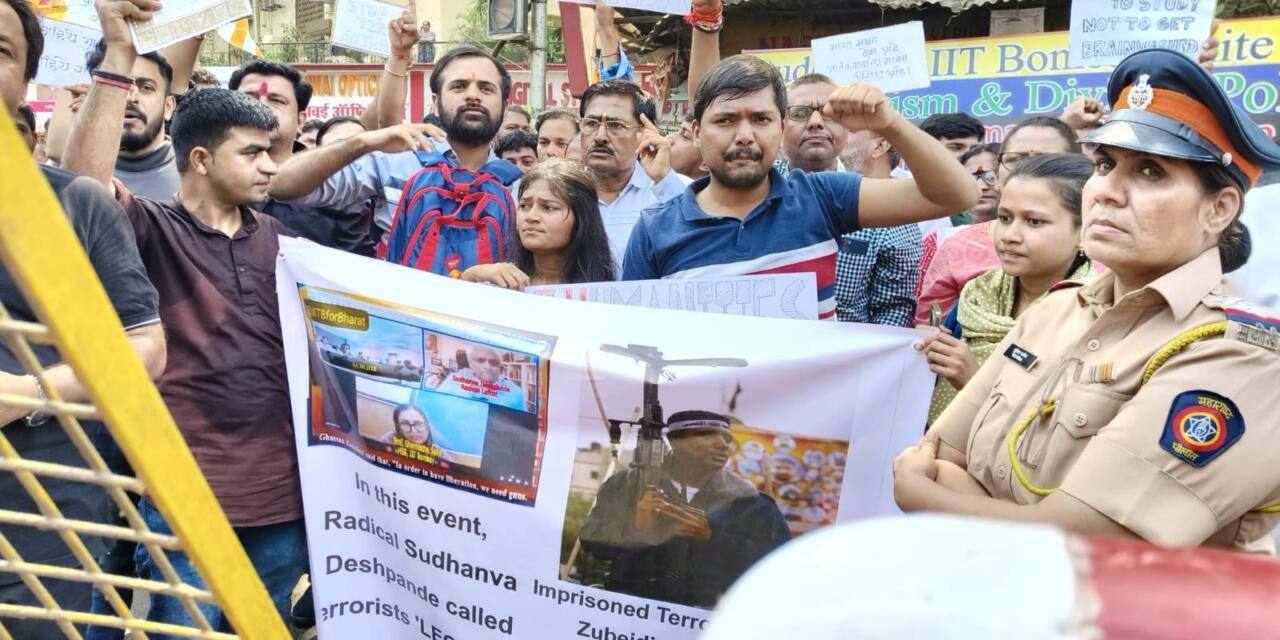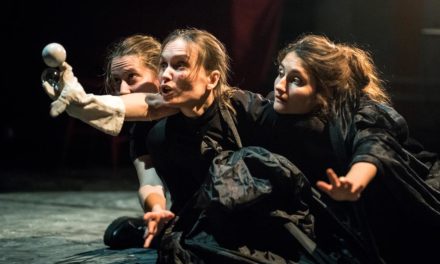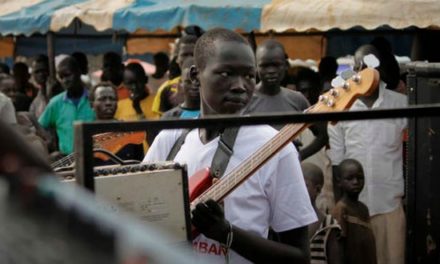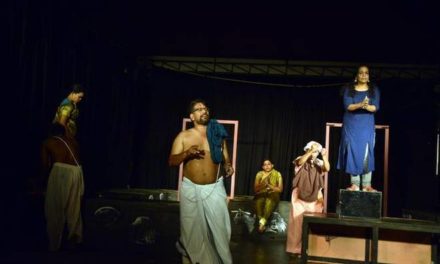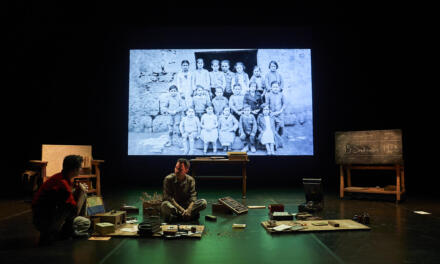What is the task of a humanities education?
The following incident, which recently took place in India, offers us much material for reflection.
It is an indication of the ripple effects of problematic responses to the Israeli-Palestinian conflict in parts of the Global South.
It teaches us a lesson about the importance and complexity of historical context.
It warns us about the perils of shortcuts and hastily jumping to conclusions.
It asks us to carefully consider the difference between explaining violence and condoning it. And why ignoring this difference is, in fact, a form of violence in itself.
More than a month after Israel launched an extensive, genocidal aerial bombardment and large-scale ground invasion of Gaza in response to Hamas’ multi-pronged attack of southern Israel, Dr. Sharmistha Saha, Assistant Professor in English at the prestigious Indian Institute of Technology Bombay in Mumbai, arranged a classroom screening of the Dutch-Israeli documentary Arna’s Children (2004) by Juliano Mer-Khamis and Danniel Danniel. The intention behind the screening of the film and its accompanying introduction by theatre maker and writer Sudhanva Deshpande was for students to gain a deeper understanding of the conflict and to reflect on the role of arts and culture therein.
A student attending the film screening began filming the session without seeking permission. He continued to do so even after Dr. Saha requested him to stop. Following the event, a group named Vivek Vichar Manch (‘enlightened thinking forum’), affiliated to the Rashtriya Swayamsevak Sangh (RSS), the paramilitary organisation behind the ruling BJP party, filed a police complaint about the professor and the guest speaker. The complaint letter accused Saha of abusing her position as professor to organise an event wherein violence and terrorism were supposedly glorified. It quoted from Deshpande’s presentation, accusing him of promoting ideologies linked to terrorism.
The video clips were subsequently sent to numerous tabloid TV channels, which were quick to put out news items that followed what is by now the well-known pattern of combining disinformation, poorly investigated claims and eyeball-catching headlines. A demonstration was organised in front of the IIT Bombay campus demanding that Saha’s contract be terminated and proclaiming “zero tolerance to terrorists and their sympathizers” and “traitors to the country should be shot dead”. The university has since installed a committee to inquire into the ‘incident’. Deshpande issued a press statement clarifying his position and correcting the false and vindictive portrayal of the incident in the news media. The Faculty Forum, an association of faculty members of IIT, has also issued a press statement backing their colleague, Sharmistha Saha.
In this fog of moral outrage, blind accusations, media manipulations, police interventions and institutional bureaucracy, there seems to be no place for any informed understanding of reality. Undoubtedly, this incident will eventually pass and the noise will die down, before our attention will be drawn to the next scandalous news story. When, however, will we grasp how damaging the consequences of this vilification are to the ethos of a humanities education?
As international scholars and researchers in the field of theatre, we feel compelled to reflect on the broader implications of this incident. We are saddened to see that the efforts of experts like Saha and Deshpande to educate the Indian public about cultural resistance in the context of Israel and Palestine have been misconstrued in such a hostile manner. It is deeply unfortunate that we have reached a point where it has become necessary to elaborate why it is absurd to claim that the film Arna’s Children promotes terrorism. And it is a matter of profound concern that those who encourage students to view and discuss it are being publicly harassed with the full backing of the news media. We seek to shed light on why we believe the students and protestors associated with Vivek Vichar Manch have not only drawn false and hasty conclusions but have also acted in an irresponsible and ill-informed manner.
On the film Arna’s Children
The film Arna’s Children is available to watch for free on YouTube. It provides a nuanced portrait of the end of the life of Arna Mer-Khamis, Juliano Mer-Khamis’ Jewish mother, her establishment of the Care and Learning Project and the Stone Theatre in the Jenin refugee camp, and the lives of her students. Arna Mer-Khamis fought with the Palmach and Israel Defense Forces during the 1948 Arab-Israeli War before marrying Saliba Khamis, a Christian-Arab intellectual, journalist, human rights activist and distinguished Palestinian figure in Israel’s Communist Party. Juliano — the second of their three sons — grew up in Haifa and subsequently enrolled as an Israeli paratrooper. After a dispute with his commanding officer, (in which he was rescued by the first head of Mossad and his mother’s cousin, Isser Harel), he attended Tel Aviv’s Beit-Zvi School for the Performing Arts. Following an illustrious career in the Israeli independent film industry, Juliano decided to help his mother and film her work in the Jenin refugee camp. A culture of both peace and sumud (steadfastness) was implicit in the agenda of Arna’s centre, which not only functioned as a place of refuge for children through games and cultural activities but also helped disseminate political pamphlets. After Arna’s death from cancer in 1995, Juliano joined Israel’s Habima Theatre and did not return to Jenin. But with the bulldozing of Arna’s centre in 2002 during the Israeli invasion of the Jenin refugee camp, he returned. During this time, Juliano completed the film, documenting the complex history of how many of ‘Arna’s children’, who had studied, played and learned theatre under their charge, participated in the armed struggle against the Israeli occupation and were killed by the end of the Second Intifada.
Only Zachariah Zubeidi, a chief of the Al-Aqsa Martyrs’ Brigades (an armed coalition described as the military wing of Fatah), survived. He renounced armed struggle as part of an Israeli amnesty in 2007. Together with Juliano and Jonatan Stanczak (a Swedish-Israeli activist), he helped establish the Freedom Theatre, which was built on the foundations laid by Arna.
The Freedom Theatre was thrown into the spotlight when Juliano was assassinated on 4 April 2011 in his car outside the theatre with his son in his lap. The murderer was never found. While some speculate the killer was contracted by discontented, influential figures in Israel, a large group of people consider the Palestinian Authority or angered upholders of Islamic tradition as responsible for Juliano’s death.
Much of this speculation stems from the mixed messages that the theatre conveyed to donors, international visitors and spectators. The Freedom Theatre officially branded itself through terms such as ‘cultural intifada’ and ‘cultural resistance’. Simultaneously, however, it often depicted its mission as one of containing violent conflict. Thus, when the American philanthropist Charles Annenberg visited the theatre before granting one of its first substantial donations of $200,000, Juliano argued, ‘I don’t think the gun can free Palestine but I believe that culture, poems, songs, books can free Palestine and it already freed a lot of people’. Similarly at a conference in Bonn, Christa Meindersma, director of the Prince Claus Fund, quoted a student from the Freedom Theatre: ‘The theatre has given me the chance to become an actor instead of a martyr.’ The influence and the success of art in a crisis can hardly be expressed more clearly, the report of the conference concluded.
Juliano was painfully aware of the theatre’s precarious, complicated relationship with some of the residents of the Jenin refugee camp, despite Zakaria’s pivotal role in its management and protection. In a BBC interview he said, ‘we are fighting a lot of fundamentalists that see what we are doing as a disgrace … We are fighting a lot of enemies, before, before we get to the Israeli soldiers.’ Likewise, his chastising of female international volunteers who sunbathed on the theatre’s roof in full view of the adjacent mosque, his rules prohibiting female staff members to socialize in public after sunset, and the videotaped premonitions of his death indicate that he recognized the danger if not the intractable contradictions embedded in the theatre’s mission. Juliano understood that the idea of cultural resistance subsuming violent conflict by means of a ‘universal’ freedom that would ‘achieve liberation from all the elements of the occupation, including the internal social oppression’, was a precarious one in a place that was proud of its militant past.
Nevertheless, with Zakaria’s constant support, he continued to stage controversial productions such as his last 2011 Alice in Wonderland where Alice, the only woman not wearing a hijab, escapes her engagement party and arranged marriage, symbols of the tyrannical tradition that oppresses women. A few weeks later, pamphlets were circulated describing ‘the suspicious theatre … whose only goal [was] to spread corruption and Western culture’. A week after the last performance, Juliano — despite Zakaria’s unwavering friendship and constant support — was no more.
On training minds to grapple with complexity
In light of the Freedom Theatre’s complicated political legacy, its tragic embodiment of the life-threatening ambiguity of artistic production, and its mixed Jewish-Palestinian institutional history, it is patently absurd to consider a screening of Arna’s Children as terror-glorification. The film has been screened to great acclaim around the world. The Freedom Theatre in Jenin has been supported by numerous prominent intellectuals and organisations.
More specifically, Zakaria belonged to Fatah, an organisation that has historically been fundamentally at odds with Hamas. The film thus has nothing to do with Hamas, a point Deshpande also highlights in his press statement. For the protestors and media to paper over this complexity with sweeping terms such as ‘pro-Hamas’, ‘anti-national’, and ‘terrorism’ indicates a problematic decline in the intellectual curiosity and critical inquiry so fundamental to scholarly practice in India.
Indian university campuses are very accustomed to discussions around difficult, uncomfortable, and complex issues. Professors consider it their duty to offer students context, to make them aware of the multiple dimensions of a conflict, to teach them to formulate questions, and to train them in flexing their imaginative muscles by stepping into other people’s realities and opening their horizons. In the spirit of critical inquiry, students are encouraged to provide contradictory, controversial feedback in a respectful, thought-provoking manner. Even a superficial viewing and discussion would, accordingly, suggest that the film — like most cultural artefacts — can be read in a number of different, often conflicting ways.
Groups like Vivek Vichar Manch may have succeeded in generating moral panic with inflammatory and jingoistic claims, which are blown further out of proportion by TV news channels with no standards of journalistic rigour. They are part of a broader ecosystem wherein disinformation around what is happening in Palestine is widespread and Palestinians are viewed as sub-human. As recent reports have shown, this is a new, worrying trend: India is compared to Israel and Muslim minorities in India are compared to Palestinians and both are clubbed as existential and bodily threats to the nation. What they fail to grasp is that India has and continues to have a longstanding relationship with the Palestinian Authority. Palestine has a diplomatic mission in Delhi and the Government of India has a Representative Office in Ramallah in the West Bank. The protests on social media and outside IIT Bombay merely demonstrate ignorance of historical fact and an intolerance for open-minded intellectual engagement.
Respecting the university’s code of conduct
Sharmistha Saha and Sudhanva Deshpande are both well known in the theatre field in India and internationally. They are established practitioners and scholars in their own respective areas. Saha’s doctoral research on theatre and national identity in colonial India was awarded the highest grade ‘summa cum laude’ at the Free University in Berlin. She has received many awards and fellowships and has published widely and internationally in the field of theatre history and cultural policy. Sudhanva Deshpande has decades of experience as a theatre maker, actor, writer, editor and publisher. He regularly gives lectures and workshops and has been invited to prestigious theatre institutions around the world. The theatre group Jana Natya Manch, with which he is affiliated, has had a longstanding collaboration with the Freedom Theatre in Jenin. They developed a joint production which toured across eleven Indian cities in 2015-16. It is therefore discreditable and callous of the TV channels to designate them as terrorist sympathisers.
Finally, it is alarming that the student at IIT Bombay filmed the session without the lecturer’s permission and continued to do so, despite being requested to stop. This is not only disrespectful toward the teacher and the guest speaker, but also violates the basic codes of conduct of a university. A classroom can only become a space of learning when people agree to hear each other out, to give each other the benefit of the doubt and to challenge each other using reasonable and substantiated arguments. Even when there are fundamental disagreements on a topic, it is imperative to engage in discussions in an open and curious manner. Public universities such as IIT Bombay possess codes of conduct pertaining to issues such as social safety, sexual harassment and discrimination. There are established procedures for reporting what may be deemed as inappropriate classroom behaviour. Filing a complaint at a police station; disseminating video clips to the media without consent; and demanding the termination of the teacher’s employment without adhering to any standard procedures and involving groups such as Vivek Vichar Manch, who were neither present at the film screening, nor have anything to do with the university, all stand in complete violation of the principles of higher education pedagogy.
We are, therefore, hopeful that the senior management at IIT Bombay will see through the empty hysteria and allow Dr Saha and her colleagues to continue their work to the best of their abilities. We are heartened to learn that all the other students present at the event jointly submitted their testimonials to the institution speaking out against what Vivek Vichar Manch made of it. It is in such students that we place our hopes for the future of higher education in the field of theatre.
Although this incident and its fallout is specific to the Indian context, we believe its lessons are relevant to anyone teaching the humanities and grappling with the question of how to reckon with the ongoing unfathomable violence in Palestine/Israel. War and occupation and genocide are never comfortable topics. They need to be tackled with care for language, representation and histories. Theatre in the context of war is not just what is presented on stage, but encompasses the practices of making theatre against all odds. Not all of it is benign and praiseworthy. Yet it can never be understood through the lens of good vs. evil. The ambivalences and radical uncertainty of theatre offer a necessary antidote to the deadly binaries of conflict. The task of a humanities education is thus to cultivate a sensitivity for suffering of all kinds as well as a generous capacity to imagine its overcoming.
This post was written by the author in their personal capacity.The opinions expressed in this article are the author’s own and do not reflect the view of The Theatre Times, their staff or collaborators.
This post was written by Sruti Bala and Rashna D. Nicholson.
The views expressed here belong to the author and do not necessarily reflect our views and opinions.

